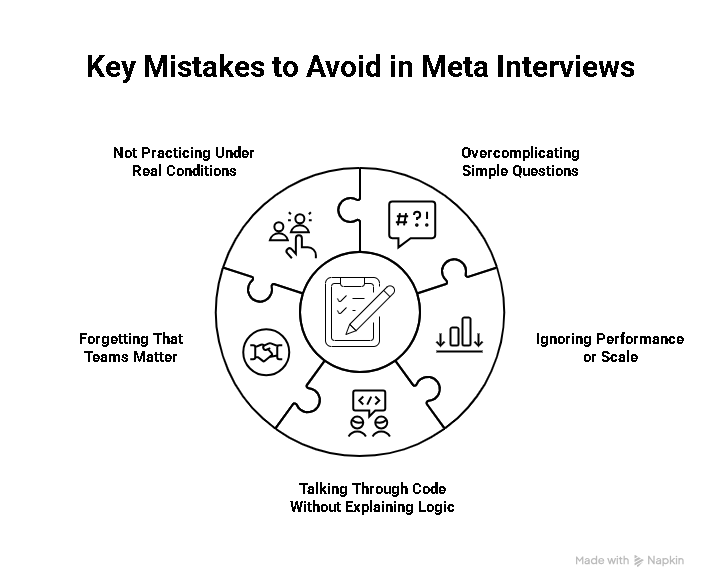Interviewing for a Data Engineer role at Meta isn’t just about knowing SQL or cleaning data. It’s a test of how you think, build, and explain under pressure. Meta wants data engineers who can handle billions of records, collaborate with product teams, and design systems that work—at scale.
But here’s the good news: Behind every “tough interview” is a pattern. Meta’s questions are predictable if you prepare in the right areas. This guide breaks down what they ask, why they ask it, and how you can turn your experience into confident answers.
If you’re aiming to tackle everything from Python data tasks to designing scalable pipelines, you’re in the right place. Let’s walk through what to expect at each stage—so you can approach your Meta interview with skills, clarity, and a strategy that works.
What Makes Meta’s Data Engineering Role Unique
Meta isn’t just building apps—it’s managing data at a scale most companies never reach. That’s why their data engineering role stands out.
As a data engineer here, you’re not just writing SQL or building dashboards. You’re helping shape how billions of users connect, communicate, and share content every single day. Think of it as building the pipes that keep the whole engine running smoothly. Millions of events flow through these systems each second—and your work helps make sense of it all.
Key Responsibilities That Set This Role Apart
- Scaling data pipelines that serve multiple global products: Facebook, Instagram, WhatsApp, and more.
- Working closely with teams in product, analytics, and infrastructure—not just other engineers.
- Applying engineering logic to real user behavior, helping improve features like News Feed, Reels, and Ads.
- Adapting to huge datasets and using tools like Spark, Presto, and Hive to crunch them faster and smarter.
Skills Meta Looks For
Meta wants builders with three things:
- Strong SQL and Python skills to organize, process, and query massive datasets.
- Experience with distributed systems—because data at Meta doesn’t live in one place.
- Clear communication—you’ll explain your work to both tech and non-tech teammates.
Transitioning from tools to teamwork marks the difference in this role. At Meta, data engineers are expected to think beyond pipelines and into product impact.
Inside the Meta Data Engineer Interview Process
Meta’s interview process is structured, but it isn’t random. Each step is designed to test how well you can think, build, and communicate as a data engineer working on real, high-scale problems.
Stages of the Process
You’ll typically move through four main stages:
- Recruiter Screen
A short discussion to confirm your experience, interest, and general fit. Expect questions about your background and why you’re interested in Meta. - Technical Phone Screen
This is where the real evaluation starts. You’ll write live SQL and/or Python code in a shared editor. Be prepared to explain your logic. They want to see how you approach messy data or solve edge cases. - Onsite or Virtual Onsite
You’ll face 3–4 rounds back-to-back:- SQL problem-solving
- Python/ETL coding
- Data modeling or system design
- Behavioral or “soft skills” interview
- Hiring Manager Round
This final call looks at your long-term fit, ownership mindset, and how you’ve solved problems in past roles. It’s less about syntax and more about impact.
What They’re Really Testing
- Can you write clean, efficient SQL without overthinking?
- Can you process and transform raw data using Python?
- Can you architect scalable pipelines that won’t collapse under traffic?
- Can you work with others and explain your choices clearly?
They’re hiring builders who understand data and people. Meta wants to see if you’re the kind of person who can handle pressure, solve issues no one saw coming, and keep your cool when a system breaks at 2 AM.
Top Meta Data Engineer Interview Topics (With Sample Questions)
If you’ve ever wondered what kinds of challenges Meta uses to test data engineers, here’s the simple answer: they focus on real problems you’ll solve on the job.
These topics show up almost every time — so mastering them gives you a clear advantage.
SQL
Expect questions that go beyond simple joins or filters. You’ll work with big tables, messy data, performance issues, and tricky edge cases.
Sample Questions:
- How would you return the top 3 comments per post, sorted by reactions?
- Write a query to find users who liked posts in two different categories.
- Rewrite a slow query using better indexing or fewer subqueries.
Python & Data Transformation
These questions test your ability to clean, merge, and structure large datasets. You may need to build a basic ETL-like function in real-time.
Sample Questions:
- How would you combine multiple JSON files with different schemas?
- Write a function to remove duplicates from a 2GB CSV file that doesn’t fit into memory.
- Create a script that validates and logs errors in incoming data batches.
Data Modeling
Meta wants engineers who can turn business needs into data structures that scale. They’ll ask you to think out loud while designing.
Sample Prompts:
- Design a schema to track user reactions (likes, shares, saves) across apps.
- Build a model for managing ad impressions and clicks by device type.
- How would you handle time-based events and retroactive data changes?
System Design & Big Data
These problems focus on building pipelines and systems that handle millions of events per second.
Sample Challenges:
- Create a real-time pipeline to track Instagram Stories views.
- How would you balance cost vs. performance for daily engagement roll-ups?
- Explain how you’d detect delays or drops in a data pipeline.
Behavioral Questions
Technical skills get you through the door, but your soft skills help you stay inside. These questions check how you think, act under stress, and work with others.
Common Examples:
- Tell me about a time you fixed a data failure no one else could figure out.
- How do you handle conflicting feedback from engineers and analysts?
- Describe a project that taught you something unexpected.
Now that you know what they’ll ask, it’s time to focus on how to prepare — and what helps you move from “knowing” to “ready.”
How to Prepare for Meta’s Data Engineering Interview
To succeed in a Meta data engineering interview, you need a plan—not random practice. The best strategy is to focus on the areas Meta tests most, and build real skills through hands-on work—not just theory.
The Three Skills You Need to Prioritize
Meta interviews consistently test these three areas. Make them your core focus:
- SQL
You’ll be asked to write queries involving joins, window functions, and aggregations. Practice solving problems that involve large tables and real business logic. - Python for Data Tasks
You’ll write code to clean, transform, and process data. Practice writing scripts that handle messy input, large files, or batch data. - Data System Design
This is about building end-to-end pipelines that scale. You may be asked to design systems for tracking user behavior, processing logs, or updating dashboards in real time.
Why these matter: Meta’s systems move billions of events every day. They want engineers who can build tools that don’t crash when traffic spikes.
Tools and Resources That Actually Help
You don’t need a massive list of platforms. Just pick from these and stick to them:
- SQL: StrataScratch, LeetCode (Database section)
- Python: HackerRank (Data-focused challenges), real data projects on Kaggle
- System Design: YouTube channels like Gaurav Sen or Tech Dummies, plus the book Designing Data-Intensive Applications
Focus on practicing in a way that mirrors the interview. Work on problems with time limits. Explain your solutions out loud. Build mini-projects instead of watching endless videos.
A Simple 4-Week Practice Plan
If you’re starting fresh, here’s one way to prepare without burning out:
| Week | Focus | What to Do |
| 1 | SQL Mastery | Solve 5 SQL problems per day |
| 2 | Python + Data Tasks | Build an ETL script using public data |
| 3 | System Design Basics | Mock-design 2–3 complete pipelines |
| 4 | Mock Interviews | Do 3 live interviews + fix weak areas |
Keep reviewing your mistakes. That’s how you learn the fastest.
Now that you have a plan, it’s time to see what actual interview scenarios look like—and how to think through them under pressure.
Sample Meta Data Engineer Interview Scenarios (With Mini-Solutions)
Wondering what a real interview challenge at Meta feels like? Here’s a sneak peek at the kinds of problems you’ll solve—described in plain language so you get the idea without getting buried in code.
SQL Scenario
The Question:
Find the top 3 posts with the highest number of likes for each user.
How to Think About It:
Meta wants to see if you understand sorting and grouping. You need to group posts by each user, rank them based on likes, and return only the top results.
What They’re Testing:
Whether you know how to filter, sort, and analyze large data tables efficiently.
Python Data Task
The Question:
You’re given several log files from different servers. Some rows are missing fields or corrupted. How would you combine them into one clean dataset?
How to Think About It:
Read each file one line at a time, skip broken lines, and standardize the format before merging. Keep track of which rows were valid and which were skipped.
What They’re Testing:
Your ability to handle real-world messy data using Python, especially at a scale where you can’t load everything into memory at once.
Data Modeling Scenario
The Question:
Design a way to store different emoji reactions (like, love, laugh, etc.) for posts in a database.
How to Think About It:
You’ll likely design two tables: one for storing each reaction event, and another to define what each reaction type represents. This makes the data easy to use and easy to expand when new reaction types are added.
What They’re Testing:
Your grasp of database design and your ability to create flexible, organized structures.
System Design Scenario
The Question:
Build a real-time system to count how many people viewed Instagram Stories within seconds of them watching.
How to Think About It:
Break the solution into three steps:
- Capture each view event in real-time
- Process and count them quickly
- Store the totals in a fast database so the app can show updated counts with no delay.
What They’re Testing:
Your understanding of real-time systems, data flow, and scaling under heavy traffic.
Common Mistakes to Avoid

Even skilled engineers slip up during Meta interviews—not because they lack knowledge, but because they overlook a few key areas. Here are the five mistakes you should avoid:
1. Overcomplicating Simple Questions
Many candidates think Meta expects an edge-case, high-tech solution every time. Often, the interviewer just wants a clean, efficient answer. Solve the problem first, then optimize if asked.
2. Ignoring Performance or Scale
You might write a correct answer, but if it doesn’t scale, it won’t fly at Meta. Always consider data size, memory, and time—even if the problem seems small.
3. Talking Through Code Without Explaining Logic
Interviewers don’t read your mind. Explain your thought process clearly as you go. It’s like telling someone why you turned left while giving directions, not just pointing at the map.
4. Forgetting That Teams Matter
Meta cares a lot about collaboration. If you act like a “lone wolf” during interviews or dismiss other ideas, it signals you might be hard to work with—no matter how smart you are.
5. Not Practicing Under Real Conditions
Solving problems at home with music on is different from solving them while someone watches you share a screen. Practice live coding and mock interviews to build that muscle.
Conclusion
Landing a data engineering role at Meta isn’t about being the smartest person in the room—it’s about being prepared, focused, and thoughtful under pressure.
You now know the kinds of questions they ask, the skills they care about, and the mistakes that hold candidates back. Use this guide not to memorize answers, but to build habits: practice real problems, explain your thought process clearly, and always think about scale.
With consistency and the right approach, the interview becomes less of a mystery and more of a challenge you’re ready to tackle. Start small, stay disciplined, and treat every practice session like the real thing. That’s how you walk into the Meta interview feeling ready—not lucky.
You’ve got this. Now go build, solve, and show them how you think.




